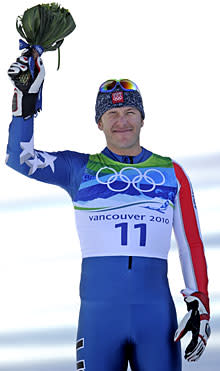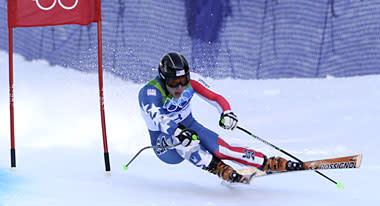Miller, Weibrecht propel talk into greatness
Follow Charles Robinson on Twitter at @YahooSportsNFL
WHISTLER, British Columbia – Sasha Rearick sat in a room in November, names ticking through his mind and then rolling off his tongue. Where the rest of the world was looking at the U.S. ski team and seeing pockets of concern – maybe even full-blown craters – the men's head Alpine coach saw finite potential. Maybe even something special.
"This is not just all Lindsey [Vonn]," Rearick said. "There is a lot of talent, with both the men and women. This could be a very good team. But who is going to show up? Who is going to ski the way everyone expects Lindsey Vonn to ski?"
On Friday, the U.S. delivered an emphatic answer with another two-American podium as Bode Miller took silver and Andrew Weibrecht bronze in the super-G. That gives the Americans six medals in only four races and sets a new standard in U.S. Alpine racing. The medal total surpasses the vaunted 1984 team from the Sarajevo Games, which produced five medals in six races. But with six races left in Vancouver, the program has a chance to produce one of the most decorated U.S. groups in the history of the Winter Olympics.
"We've still got a lot of starts ahead of us, and we've got guys who are medal contenders in every event that we go to," men's head speed coach Chris Brigham said. "We knew that coming in here that we had a chance for something big."
But how big? The haul already puts this Alpine group in elite company, dueling the '84 team that has long set the standard. The '84 team has been one of the most beloved in the sport, led by cocksure Bill Johnson, who came from nowhere to seize gold in the downhill and crack the suffocating hold that European countries had on the event. Prior to winning the medal, Johnson infuriated his competition by predicting he would capture gold. The wave of momentum from the win went a long way, as the Americans ultimately captured two more golds and two silvers.
Even with Vonn dominating the World Cup circuit and the considerable talent of Bode Miller, nobody could have predicted the U.S. would come out and capture six of the first 12 medals awarded in Alpine. Particularly when an injury to Vonn and meltdown by Miller left both without a medal in Turin in 2006. And from a health standpoint, the team appeared to be a wreck, with multiple injuries hobbling Vonn (shin), Miller (ankle) and Julia Mancuso (back).
But Miller's bronze in the first event of these Games – the men's downhill – provided the program's first shot of adrenaline. Not so much for the medal itself, but for the fact that Miller skied so remarkably well, finishing only .09 seconds from gold. And when Vonn and Mancuso followed with gold and silver in the women's downhill, the team could feel an unmistakable wave of momentum. The team wasn't just talented, it was clutch, too.
"As soon as you watch your teammates experience that joy, that excitement, it makes it much more real and much more accessible for the other athletes," Miller said. "They see it. They see someone they know well and that they feel a direct connection with. I think it makes them reach for it a little more authentically. That's what you're seeing. Once that momentum starts, everyone starts to want that more. They race really aggressively and from the heart, too."
Mancuso did just that in the women's super combined, skiing strong and confident in the slalom portion despite not typically being a strong slalom skier. For coaches, her silver helped ease the pain of watching Vonn fall and fail to finish in the same race.
"Julia has definitely set it up for everybody," Brigham said. "Obviously the whole hype was to talk about Lindsey coming in and the high expectations for her. But to see what Jules has done, and Bode has been tremendous in the first two races, and Andrew had a great start number and took advantage of it today. It's exciting. I'm so damn psyched."
Weibrecht might be the perfect example of what could take this team from just being good to becoming something historic. One of the most aggressive skiers in the U.S. program – nicknamed "Warhorse" for his all-out, ballistic style – Weibrecht finished a disappointing 21st in the Olympic downhill. Afterward, he trudged through the mixed zone, stopping at one point to tell a friend how nervous he had been skiing in his first Olympics.
"It sucked," Weibrecht told his friend afterward. "I wasn't having that much fun this morning. I just wanted to get this thing over."
Five days later, and with his jitters gone, Weibrecht used his No. 3 starting position to his advantage, charging down a course that would deteriorate throughout the day. He held onto the lead until Miller nudged him out by .03 seconds, giving the Americans the top two times until Norway's Aksel Lund Svindal put up a 1:30.34 to capture gold.
But Weibrecht's medal was a major accomplishment, testifying to the overall talent of the U.S. team. Indeed, Vonn, Miller and Mancuso could add additional medals before the Games end, as well as Ted Ligety, who took the gold medal in the men's combined in Turin in 2006. And when you talk to the Americans now, you get the feeling that they believe all of those skiers will pile onto the medal count in the coming days.
"A little bit of momentum goes a long way," Weibrecht said. "Bode starting off really strongly, then Julia and Lindsey having a good result, then Julia [medaling in the super combined]. Momentum as a whole team kind of built. They helped us to believe in ourselves."
And that belief may even be stretching a little further, as evidenced by Miller's news conference on Friday. Asked how America had been able to dominate Alpine so thoroughly in the early going, Miller shot back with some straight-faced swagger.
"Well, aside from the fact that we're just much better than everyone else …"
The crowd erupted in laughter. Even Miller had to let a little smile slip. But beneath the lightness of the moment, the underlying message was clear: The talk of potential has given way to historic measurement. But this American team is starting to believe in its own greatness, and the medal count is making their argument for them.


